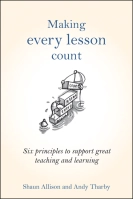
In this week’s 15 minute forum, English teacher Andy Tharby discussed how we can create and sustain a fertile culture for academic excellence.
*
Our school is situated in a coastal town and has an intake that covers a large social demographic. We are currently asking an interesting question: how can we help students from all backgrounds and academic starting points achieve academic excellence? One small but significant group of students have been at the forefront of our attention – those who achieved highly at KS2, but are making less progress than those who arrived at lower starting points.
In The Hidden Lives of Learners (2007), the researcher Graham Nuthall (2007) theorised that there are three interlinked worlds that shape a student’s learning:
- the public world of the teacher;
- the highly influential world of peers;
- the student’s own private world and experiences.
If we are to help more students achieve academic excellence and aspire to the top then we need to tap into each of these worlds. In an ideal school, these three worlds would work in tandem to reinforce and support each other. The curriculum would be challenging and coherent; the teaching would be inspiring and stretching; students would be influenced by each other to value academic learning; students would believe that they can and will become a success.
As we know, there are so many aspects to a student’s home life that can provide a barrier to success and aspiration. Ultimately, the best we can do is to get the school culture right. From the moment a child walks through the gates in the morning, until the moment he walks out, he should be immersed in a world that values and celebrates academic learning. This culture should infiltrate every nook and cranny of school life.
Teaching and curriculum
There have been plenty of books and courses written about how to get the most out of high-ability students in lessons. I would suggest that there should be three key principles: content, thinking and shaping. (See here for more details.) In other words:
Is the content of lessons and the curriculum sufficiently challenging?
Do students work from tasks and questions that ensure that they think deeply about this content?
Do students know how to shape their knowledge into successful work – such as extended writing and performances and products?
It is very important that we define high-level content very precisely. Have a look at the wonderful An Inspector Calls resource used in English lessons, for example. The challenging concepts and vocabulary are clearly labelled:


Another sensible approach is to teach sophisticated vocabulary explicitly and expect to students to use it in their written and oral work. Geography teacher Hannah Townsend does this from Year 7:

Self concept
‘… the effect of achievement on self-concept is stronger than the effect of self-concept on achievement’
Daniel Muijs and David Reynolds, Effective Teaching: Evidence and Practice, 3rd edn (London: Sage, 2011), p. 148
It is important that high-achieving students come to see themselves as high-achieving students. The answer to the question ‘Who am I?’ needs to be ‘Someone who is doing well at school, and wants to do even better’. Even though the best way to help students feel that they are doing well is to help them to achieve (as Muijs and Reynolds point out), our interactions with students can smooth the way for this process. A well-timed one-to-one discussion, a quick call to a parent or a touch of public praise at the right moment can make all the difference – especially with those who struggle to believe in themselves.
These questions are useful:
How can we help our high-starting students to see themselves as high-achievers?
What kind of conversations and interactions will have an impact on them?
How can we improve their confidence and sense of self-efficacy in the task at hand?
How can we tackle ‘imposter syndrome’?
How can we better help able, disadvantaged children to feel part of the ‘bright set’?
School and peer culture
School and peer culture are linked in complex ways. Peer culture is a mysterious thing; how we adults envisage our school might not be how many students see it when they are together. This division is likely to create unseen tensions, especially for those who have yet to decide whether to seek acceptance from the whole school academic culture or from the glamour of the rebellious peer group.
To tackle this we need to ensure our academic culture seeps into every crack – in the corridors, in lesson arrivals and departures, in assembly and in every interaction and conversation. School must be a safe, calm and happy place. Kindness and politeness must take precedence. If we want children to embrace the world of academia and knowledge, then this must be an easy choice – in every way, school must be more civil and civic than the streets. If we want our children to go on and succeed in the world, we also have a duty to teach our students the habits and behaviours that will help them to gain access to this world. These are interesting questions to ask:
How do we encourage students to aim for the top and support their wellbeing as they do so?
How do we make academic achievement and a love of learning even more socially desirable?
How should adults model language use and social interaction?
How well do we expect these behaviours in our students?
In all, if we are to encourage more and more students to aim for the very top, then we must all play our part in the wider school culture – however immeasurable these actions may be.
The first place to start, as always, is in the way that we model and encourage language use – both in and out of lessons.









Reblogged this on Design Technology & Engineering Teaching Resources and commented:
Creating a culture for academic excellence
Changing a school culture is difficult but important so thanks for sharing and I look forward to reading how it goes.
Is there a danger that by focussing solely on academic achievement you make it harder than it needs to be? Say your high KS2 underachievers have friends with low/middling attainment. Their goals are in conflict; they want to achieve academically but to do so means saying implicitly to their friends ‘i’m better than you’ which puts a strain on their friendship. Emphasising how uniquely great academic achievement is increases that strain. Conversely, if there are other dimensions of success children are less likely to feel outclassed.
Can every child, regardless of academic ability, point to something they do at school with pride?
Pingback: Educational Reader’s Digest | Friday 5th May – Friday 12th May – Douglas Wise
Pingback: Creating a culture for academic excellence | Jon Malone
Reblogged this on Reflecting English and commented:
I wrote this last week for our school blog. Thought I’d repost it here too for anyone who missed it:
Pingback: What is self-efficacy and how can we help our students to get more of it? | Class Teaching